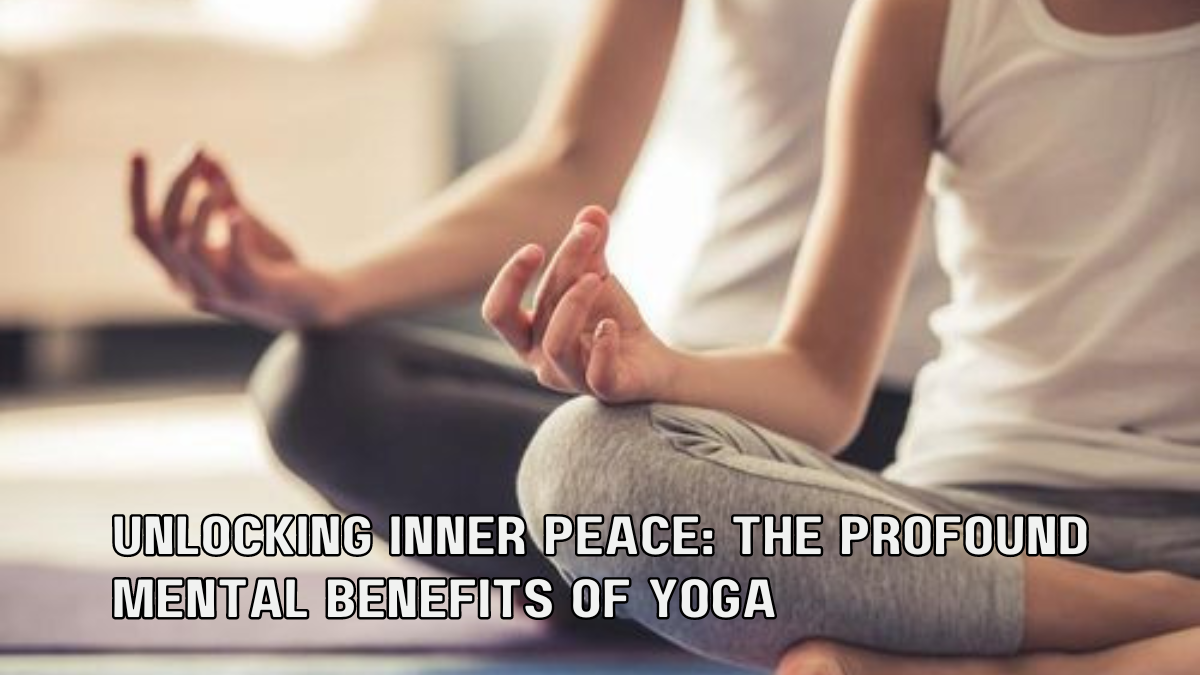Introduction
In a fast-paced world filled with endless distractions and stressors, finding inner peace can often seem like an elusive goal. The practice of yoga, an ancient discipline that combines physical postures, breath control, and meditation, has emerged as a powerful tool for achieving this elusive tranquility. While yoga is renowned for its physical benefits, it also offers profound mental advantages. In this blog, we will explore how yoga can unlock inner peace and promote mental well-being.
Stress Reduction
Yoga is an excellent way to manage stress. Through a series of gentle movements, breathing exercises, and mindfulness, yoga helps you calm your nervous system. By activating the relaxation response, it lowers cortisol levels and reduces the physical symptoms of stress. This, in turn, helps in enhancing emotional stability and creating a sense of inner calm.

Improved Mind-Body Connection
The practice of yoga encourages a profound connection between the mind and the body. As you focus on your breath and body awareness during yoga poses, you become more attuned to your physical sensations and emotions. This increased awareness allows you to recognize and release physical and mental tension, fostering a greater sense of mental clarity and peace.

Enhanced Emotional Well-Being
Yoga isn’t just about flexibility and strength; it’s also about emotional strength. Regular practice can lead to better emotional regulation and resilience. Yoga teaches you to acknowledge and accept your emotions without judgment, providing a safe space for processing them. This emotional intelligence can lead to greater inner peace by reducing emotional turbulence and promoting a sense of balance.

Mindfulness and Meditation
Yoga often includes elements of mindfulness and meditation, which are powerful tools for calming the mind. Through these practices, you learn to stay present in the moment, let go of racing thoughts, and cultivate a deep sense of inner stillness. Regular meditation in yoga can help in reducing anxiety and depression, making it a powerful tool for enhancing mental well-being.

Increased Self-Awareness
Yoga encourages self-reflection and self-awareness. As you progress in your practice, you may discover more about yourself, your patterns, and your triggers. This self-awareness is a valuable step towards inner peace, as it allows you to make conscious choices in response to life’s challenges, rather than reacting impulsively.

Better Sleep
A consistent yoga practice can improve the quality of your sleep. Many people who struggle with insomnia or disrupted sleep patterns find that yoga helps calm their minds and relax their bodies. Quality sleep is a crucial component of mental well-being, as it allows the brain to recharge and process emotions effectively.

Mindful Breathing
One of the cornerstones of yoga is conscious breathing. Breathing exercises, or pranayama, teach you to control your breath, which in turn can help regulate your mood and reduce anxiety. Deep, mindful breathing is a simple yet powerful way to find inner peace in the midst of life’s chaos.

Conclusion
Yoga is much more than a physical practice; it is a journey toward inner peace and mental well-being. The profound mental benefits of yoga, including stress reduction, improved mind-body connection, enhanced emotional well-being, mindfulness, self-awareness, better sleep, and mindful breathing, make it a valuable tool for those seeking tranquility in a hectic world.
Incorporating yoga into your daily routine can help you unlock the inner peace that lies within you. Whether you are a beginner or an experienced practitioner, the mental benefits of yoga are accessible to all, offering a path to a more serene and balanced life. So, unroll your yoga mat, take a deep breath, and embark on your journey to inner peace through the practice of yoga.












